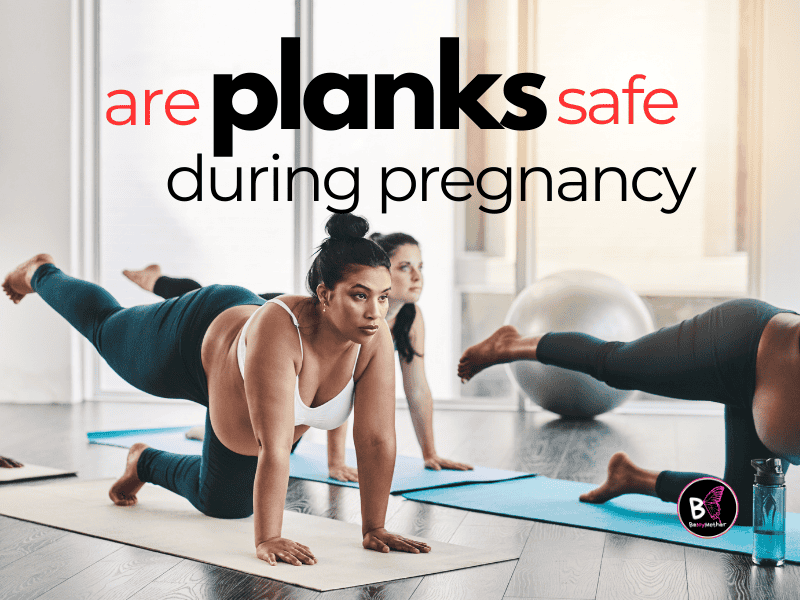Pregnancy is a time of immense joy and transformation, but it also questions what’s safe for your body—especially regarding exercise. Among these concerns, many moms-to-be wonder: “Are planks during pregnancy safe?”
The short answer is yes, with modifications. Planks can strengthen your core, support your back, and improve overall stability, but they must be done mindfully. In this guide, we will uncover 10 essential insights about planks during pregnancy, backed by research and expert recommendations, to help you maintain fitness while prioritizing your health and your baby’s well-being.
1. Can You Do Planks During Pregnancy?
The good news is that planks during pregnancy are generally safe as long as they’re performed correctly and modified to suit your trimester. Planks are low-impact exercises that strengthen the core, which plays a key role in:
- Supporting the growing belly.
- Reducing back pain.
- Improving posture.
However, if you experience discomfort, dizziness, or other warning signs, stop immediately. Always consult your healthcare provider before starting or continuing planks during pregnancy.
2. Benefits of Planks for Pregnant Women
Planks offer numerous benefits for pregnant women, including:
- Core Stability: Strengthens deep core muscles, reducing strain on your back.
- Improved Balance: Helps your body adjust to changes in weight distribution.
- Better Posture: Eases pressure on the lower back.

According to a study published in the Journal of Physical Therapy Science, core-strengthening exercises during pregnancy can significantly reduce the risk of back pain and improve daily functionality.
3. What Happens to Abdominal Muscles During Pregnancy?
During pregnancy, your abdominal muscles stretch to accommodate your growing baby. This can sometimes lead to diastasis recti, a separation of the abdominal muscles.
Planks can help prevent or minimize diastasis recti when performed with proper modifications, as they strengthen the transverse abdominis (the deep core muscle). However, high-pressure movements, like traditional crunches, should be avoided as they can worsen the condition.
4. Are Ab Workouts Safe in Early Pregnancy?
Yes, ab workouts, including planks, are safe during the first trimester for most women. During this time, your body hasn’t undergone significant physical changes, so exercises like traditional and side planks are generally safe.
Important Tips for First Trimester Ab Workouts:
- Focus on proper form to avoid strain.
- Avoid holding your breath during exercises.
- Gradually reduce the intensity as your pregnancy progresses.
5. Types of Planks Safe for Pregnancy by Trimester
It’s crucial to adapt planks to your body’s needs during each trimester. Here’s a guide to safe plank modifications:
| Trimester | Safe Plank Types | Key Modifications |
| First Trimester | Full planks, side planks | Ensure proper form to avoid lower back strain. |
| Second Trimester | Modified planks (on knees or elevated) | Use a bench or prop for extra support. |
| Third Trimester | Supported planks (with a ball or wall) | Keep movements slow and gentle. |
Always listen to your body and stop if you feel discomfort or strain.
6. Other Ab Exercises to Avoid During Pregnancy
Not all core exercises are pregnancy-friendly. Here’s a list of movements to avoid:
- Crunches and Sit-Ups: Increase pressure on abdominal muscles.
- Bicycle Twists: Can cause strain and increase the risk of diastasis recti.
- Leg Raises: May stress the lower back and pelvic floor.
Instead, focus on safer alternatives like side planks, pelvic tilts, and bird-dog exercises.
7. How Long Should You Hold a Plank During Pregnancy?
The duration of your plank should depend on your fitness level and trimester. Instead of aiming for long holds, prioritize proper form and shorter durations.
General Guidelines:
- Beginners: 10–15 seconds per plank.
- Intermediate: 20–30 seconds per plank.
- Advanced: Hold for up to 45 seconds with modifications.
Remember, quality over quantity is key when exercising during pregnancy.
8. Should You Plank on Your Elbows or Hands While Pregnant?
Both positions are safe during pregnancy, but the choice depends on your comfort and fitness level:
- On Hands: Provides more stability and strengthens the wrists and shoulders.
- On Elbows: Reduces wrist pressure but requires more core engagement.
If you feel strain in either position, switch to modified planks or consult a fitness professional for guidance.
9. When Should You Stop Doing Planks During Pregnancy?

While planks are safe for most women, there are times when they should be avoided. Stop planking if you experience:
- Abdominal pain or discomfort.
- Dizziness or shortness of breath.
- Difficulty maintaining proper form.
As you enter the third trimester, focus on gentle, supportive exercises prioritizing safety and comfort.
10. Tips for Safe Plank Workouts During Pregnancy
To make planking during pregnancy safe and effective, keep these tips in mind:
- Use Props: Incorporate yoga blocks, benches, or walls for support.
- Warm-Up: Always prepare your body with light stretching.
- Listen to Your Body: Stop if you feel pain or discomfort.
For additional guidance on staying healthy during pregnancy, check out our article on Is Olipop Safe for Pregnancy?
Daily Pregnancy Core Workout For An Easy Delivery
FAQ: Common Questions About Planks During Pregnancy
1. Are planks safe for all pregnant women?
Planks are safe for most pregnant women, but those with conditions like diastasis recti or pelvic floor issues should consult a doctor first.
2. Can planks help prevent back pain during pregnancy?
Yes, planks strengthen core muscles, alleviating pressure on the lower back and improving posture.
3. What are good alternatives if I can’t do planks?
Try pelvic tilts, bird-dog exercises, or side-lying stretches for a safe way to strengthen your core.
4. How do I know if I’m overexerting myself during a plank?
Signs include breathlessness, trembling, or difficulty maintaining form. Stop and rest if you experience these symptoms.
5. Can planks harm the baby?
Planks do not pose a risk to the baby when done correctly and with proper modifications.
Conclusion
Planks during pregnancy can be a safe and effective way to strengthen your core, improve posture, and prepare your body for childbirth. Modifying your plank routine based on your trimester and fitness level allows you to enjoy the benefits without compromising your safety or comfort.
As always, consult your healthcare provider before starting any new exercise routine, and remember—your well-being is just as important as your baby’s.
Would you like to explore pregnancy-safe fitness and health tips more? Check out our article on Tailbone Hurting During Pregnancy? for additional insights.



